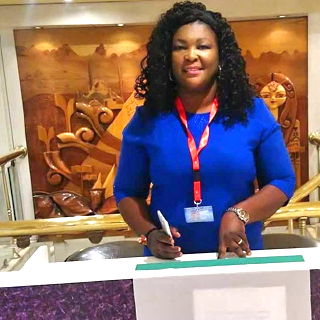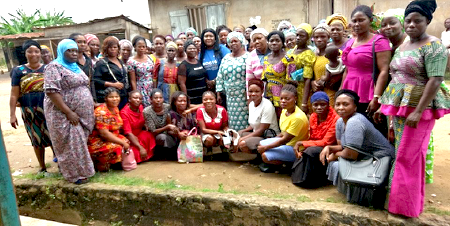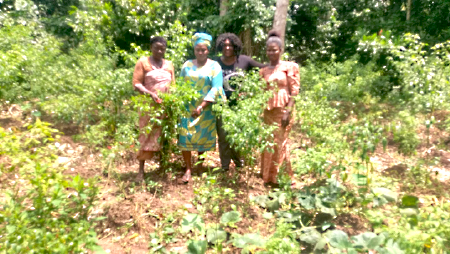Real Life Stories: People Trafficking in Nigeria (Global 21st Century Entrepreneur Initiatives)
The latest in our series of partner interviews is with Mojisola Adewumi. She is the Founder and CEO of Global 21st Century Entrepreneur Initiatives, an NGO that works with marginalized rural women and vulnerable girls through advocacy, skills-based training, micro-finance and job creation to enable them to set up small, sustainable businesses and overcome poverty, including advocating for women’s land rights. Mojisola is a dedicated gender advocate and social entrepreneur. She particularly works in the area of women’s empowerment, as well as advocating for women’s land rights and climate-smart agriculture. Mojisola has received several local and international awards, ambassadorships and scholarships. Her work with Global 21st Century Entrepreneur Initiatives focuses on providing training and awareness to empower women in their communities and to be in control of their own futures.
Liluye’s staff writer, Emma Lees, interviewed Mojisola to find out more about their work.
How did you first start in this work with Global 21st Century Entrepreneur Initiatives?
My personal experience as a girl born into an under-resourced, rural community in Nigeria stirred up my desire to become a changemaker and be an inspiration to others who are still suffering and help them along the way, particularly those in less fortunate, rural communities. They need hope to envision a future so they can manage the present.
Being passionate about women’s rights led me to community services that provide insights on the situation of rural, poor women concerning sexual and gender based violence, as well as its impact on their livelihoods. One particular case that inspired me to be involved in community service, particularly with women rights, was Sarah, my childhood friend. Sarah became an orphan before the age of 10. She was forced into an early marriage and lost her husband to death at the young age of 21. She was not only left with five children, but her rights were also very limited due to customary practices that support male dominance. It was such a dehumanizing experience to watch and an experience of severe, social injustice. It motivated me to make a positive difference for a better future. That’s how I started after I graduated in 2013 from the University of Twente.
What are your specific missions and goals?
My ultimate goal is helping to enhance the prosperity of rural, community women by increasing their accessibility to all livelihood options. This includes their social, economic, physical and political experiences. I want them to live a good life. I want them to engage themselves in a quality business for themselves; to be educated and employed and also be a role model to their children. I’m committed to promoting gender equality. l feel that is the key to social and leadership development in Nigeria. It’s also why I set up a global, entrepreneurship program for women, including improved community education and vocational training (hair styling, fashion design, make-up artistry, event planning, baking/confectionery, home cleaning, and catering) whilst also advocating for women’s rights. Specifically, we engage women through advocacy, entrepreneurship, medical and/or financial assistance, training and job creation to enable them to have sustainable businesses…it’s an alliance.
You also talked about having more access to land and ownership rights because that’s a big issue in relation to women in Nigeria, right? Do you see directly in the work you’re doing women being affected, and possibly men, too, issues of trafficking?
One of my initiatives is addressing a sensitive issue on land corruption arising from customary practices that support land grabbing/forced evictions by big corporations/high profile people who don’t respect the rights of rural, community women living in the areas. In many communities in Nigeria, there are linkages between patriarchy and the high rate of organized crime in land ownership and inheritance, further threatened by a lack of policy or strong institutions that support equal rights to land use and control. Many women in rural communities in Nigeria, particularly widows, lack access to land which could give them a livelihood. Therefore, the lack of access to land and ownership rights results in a lack of collateral. This, in turn, limits access to farming and credit facilities, thus leading to increasing levels of poverty. For instance, to overcome this trauma, many women will result in ‘self-help’ which often means sexual advances or bribery in exchange for land. This is exactly where our work comes in. l educate women on their rights, because then they can assert them. Nigeria has a history of land-related conflict, corruption, and gender discrimination in land access. Women are most affected in cases of unsecured land rights and extortions, with discrimination against their access to, ownership, and control of the land.
Here in Nigeria, women are more affected by trafficking than men because many rural women don’t have access to education or land, which makes them vulnerable to trafficking. In many families, affected by poverty and lack of economic opportunities, girls can be traded by their caregivers in return for money. They are taken away from their communities to the cities. Then, they usually end up in prostitution as the only means to survive because of unkept promises made to them, for example, usually they will receive and offer for education and/or money that can then be sent ‘home’. The reality often is very different and the girl ends up on the streets with no other options.
Basically it’s a result of poverty and the lack of opportunity that they end up in prostitution?
Absolutely! Once they’re in that situation, it’s difficult for them to get out of it. They can end up tied to it. That’s why empowerment is the key and education is a fundamental right to stop this from happening. The education and empowerment they receive from us brings them out of that chain, and out of the system of trafficking they’re living so they can live their lives. Or, so they don’t end up being trafficked and able to escape the situation that they find themselves in.
We teach them about rules and responsibilities, engage them in advocacy, and teach them entrepreneurship and vocational skills so they can become self-reliant and live an empowered life. For the vocational scheme, we teach them different skills, for example, craft or fashion work. We also work with local artisans to collaborate with them to train survivors on new skills and to encourage trade.
You are also raising awareness to let them know what life is like, if they do get trafficked?
Exactly. We have two different strategies: to work with the younger ones, and the older ones. Most of the young ones don’t know the hard work and damage done by trafficking. Some of them can get locked into it through peer pressure, through their parents, or sometimes for them to survive, even. So, we need to educate and inspire them to get an education. I believe that education is a fundamental human right for everybody, and once you are educated, you can tell what is right and wrong, and know what the future can hold for you. We work with schools to give them free education at the same time as raising awareness about trafficking. We see girls as young as 8 being trafficked to the cities by their caregivers /parents who might get some money for them. This has to stop!
With the older ones, aged 18 to 35, some have managed to come back from the cities or not go into trafficking, and sometimes they have children. If they have children, they might start to search for trafficking opportunities to improve their financial situation for either themselves or their children. Those are the people that need empowerment and entrepreneurship opportunities. We give them vocational skills so they don’t have to go back to school, and also because they need income, but they can start working and making money straight away.
Have you seen more awareness around the issues of trafficking in the last few years that you have been doing your work?
Yes. We have been taking our campaign to local churches, community bodies, and schools. I think the government needs to be proactive with awareness and there is also very high unemployment right now. It’s mainly NGOs doing the work, but the government should do their part by scaling up awareness and take action against the menace of violence and injustice against women. The government can also provide employment for people and educate them from a young age generally and about trafficking and the dangers. They need to give more urgent attention to policies that support women with empowerment, to boost their capacities, to educate them and empower them against trafficking, specifically. They have the power to do this. They have the power to help women with basic needs, social security, to help give them a sense of belonging, and to take responsibility, too. They can then become more self-aware, have self discipline and control to fight against the ancestral ways things have been done. It will help them make a difference in communities, to take leadership roles and responsibilities, and transform communities. These initiatives work to ensure that real change is happening where it is most needed and for women and girls who need support the most. We educate and empower parents and caregivers to protect children from all forms of sexual abuse through our interactive community panel and educational retreats. We advocate for open discussions about sexual abuse through community dialogue and social awareness.
We are not finished until all women are free, free to live supporting themselves, and also to flourish with all we have to offer.
The NGOs are closer to the communities, to women and girls, but the government needs to take ownership. This is the key to achieving all sustainable goals and the basis for inclusion and diversity.
What would you say has been your most memorable achievement in your organisation?
I’m very proud of many memorable achievements. Very often, l personally recognize talents, skills and knowledge in people. That awareness has helped me to provide disadvantaged women and girls with the platform they need to show their true potential and support community-led solutions on challenges women face. Most importantly, I receive a lot of pleasure from watching marginalised women and girls discover themselves in a way they never thought possible, utilizing their talents and igniting changes from within. In turn, it gives them hope and inspires girls to thrive and win. In fact, these signs of growth in these women are my fuel. They bring me strength and satisfaction and motivate me to keep going today.
The strength of the collective has given women the courage to translate their learning into reality. Part of our intervention approach is using sustainable empowerment as a tool to address all forms of social injustice among women. We realised early on that women must be part of developing solutions on issues that concern them, particularly in the area of their livelihood.
We recently created an empowerment project in 20 communities and villages in Ondo State and around there. This has created a ripple effect on more than 1,000 rural community women that now have access to various forms of vocational skills. After graduation, they later become volunteers and interns assigned to train others and help in settling up a Community Women’s Self-Help Group that works with working communities thereby minimizing the effects of poverty and trafficking, and also increasing their courage to claim back their rights. In our present work with the policy makers, we are advocating for social reforms, women’s empowerment, and gender equality at the community level. We hope to see the implementation of policies that support gender equality in land uses and control and also in the eradication of all forms of gender based violence against women.
Has there been any particular case or story of someone whose life you’ve directly impacted?
Yes! My friend Sarah, who was an orphan and left with 5 children, was demonised and denied rights by the local community. Now she is 34 and has been empowered through adult education at our community centre where she was trained on tailoring and entrepreneurship skills.
Sarah is one of the examples of many widows who received help to claim back her land after the death of her husband through our Interactive Community Panel Access. Land can then be used for agricultural purposes, as collateral, for sale or lease. Women can address issues concerning their rights, and violations of these rights, through collective action. Last but not least, many of the women we have helped were able to start their own business with loan support. For example, Sarah was able to start a business in tailoring and then used the collective learning and awareness provided by the program to claim back her land to grow cassava and vegetables. This has helped her to feed her family. And, the profit made on her baking business has enabled her to take care of her children’s public school education. Sarah’s joy knew no bounds when she enrolled her children into public school for the first time in her life after many years of abandonment. Access to land made it easy for Sarah to become a homeowner with land title and documents. Sarah is now a farmer and a baker who is contributing to her family and community. There is a very different present and future for her and her family than if we hadn’t stepped in to support and walk with her.
Where to send funding for your work?
To fund the work of Global 21st Century Entrepreneur Initiatives, please donate to:
Account name: Global 21st Century Ent.
Account Number: 0491560983
Visit Global 21st Century Entrepreneur Initiatives on Facebook: Global 21st Century Initiatives
To learn more about land corruption in African nations, watch this video:
Thank you so much for sharing your experiences with us, Mojisola and for all the work you do. Best of luck for the future.
Thank you.
For more information about Liluye or to inquire about becoming a partner, please visit www.liluye.org/contact. Or, if you are interested in donating to Liluye, please visit: www.liluye.org/donate.
Mojisola was interviewed by Liluye Staff Writer, Emma Lees, who also writes on her blog, InnerExpat.



